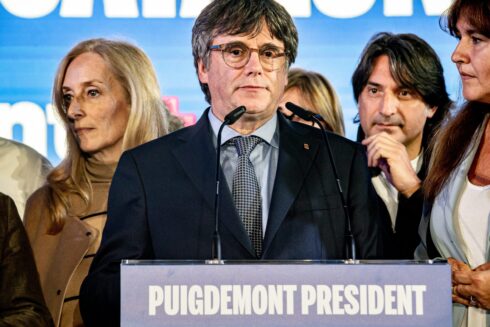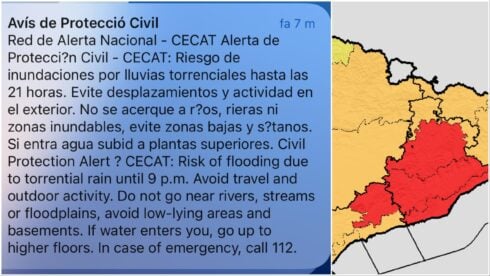FORMER Catalan premier and fugitive from justice Carles Puigdemont returned to Spain on Thursday, seven years after he fled the country to escape arrest for his role in the 2017 drive for independence in the northeastern region.
On arrival in Barcelona, he gave a speech to an estimated crowd of around 2,500 people outside the parliament building, during which he denounced the actions of the Spanish state.
He was also met with protests from supporters of far-right Vox.
He then promptly disappeared, sparking a police search with the aim of arresting him and stopping him from slipping back to a base he has in the south of France.
Read more: Carles Puigdemont will return to Spain this week after seven years in exile

“For seven years now they have been persecuting us for wanting to hear the voice of the people of Catalonia,” the politician said to the crowds. “Very harsh repression began years ago now.
“It is not, nor will it ever be, a crime to hold a referendum,” he said defiantly.
Puigdemont was referring to the vote on independence that was organised by pro-secessionist leaders on October 1, 2017.
The vote was deemed illegal by the courts, and there were shocking scenes of police violence on that day as the central authorities tried to stop Catalans from going out to vote.
Despite the lack of census and legal guarantees, those who voted chose independence for Catalunya.
“They have turned being Catalan into something that is suspicious,” he said of the Spanish government, which after the 2017 referendum and subsequent unilateral declaration of independence sacked Puigdemont’s administration and called new elections.
Puigdemont, the leader of the Junts per Catalunya party, also referred in his speech to an amnesty law recently passed by the Socialist-led government of Prime Minister Pedro Sanchez, which aims to further calm the waters between Madrid and the region and could, potentially, be applied to Puigdemont to avoid his prosecution.

“We are not interested in being in a country in which amnesty laws do not grant amnesty,” he said, in reference to the ongoing doubts as to whether the courts will apply those laws to his case or whether he will eventually be arrested and prosecuted.
Puigdemont returned today, after seven years spent living in self-imposed exile in Belgium, to coincide with the investiture debate that will take place in the parliament in the wake of the regional elections that were held in May of this year.
The result of the vote was inconclusive, but Socialist candidate and former central health minister Salvador Illa will be standing as regional premier, and is expected to have enough votes to secure the position thanks to the support of Junts’ rival party ERC (the Catalan Republican Left), and other, smaller political groups. .
The regional police force, the Mossos d’Esquadra, did not arrest Puigdemont on Thursday morning when he made his speech, despite the arrest warrant out against him.
They did, however, close the exits of Barcelona after Puigdemont vanished from public view, despite the large police presence, and were reportedly seeking a car in which he was thought to be travelling.
With his appearance today, Puigdemont was seeking to reestablish himself as the leader of the independence movement, call for the amnesty law to be applied to him, and to protest against the investiture of Salvador Illa as regional premier.
Pro-independence support has dwindled in recent years in Catalunya, however, and his return is being viewed by many as an effort to stay relevant in both Spain and the region.
At the May regional elections, separatist parties failed to win an outright majority for the first time in decades.
Click here to read more Catalunya News from The Olive Press.








